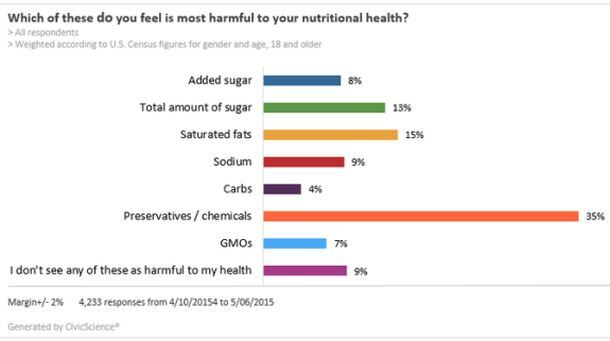In the survey, the results of which mirror the findings of a recent IFIC poll, respondents were asked: ‘Which of these do you feel is most harmful to your nutritional health?'
- Preservatives / chemicals: 35%
- Saturated fats: 15%
- Total amount of sugar: 13%
- I don’t see any of these as harmful to my health: 9%
- Sodium: 9%
- Added sugar: 8%
- GMOs: 7%
- Carbs: 4%
Not surprisingly perhaps, the over 55s (who are more likely to suffer from high blood pressure) were more likely to consider sodium to be harmful than younger people, while parents and grandparents were more concerned about all of the ingredients on the list than people without children.
Women were more likely than men to be concerned about GMOs and chemicals/preservatives, whereas men were more concerned than women about fat, salt and sugar.
Respondents who thought GMOs (genetically modified organisms) were the most harmful were also far more likely to buy organic food frequently, said CivicScience.
The results were published after Nestlé said it would remove all artificial flavours from its US frozen pizzas and snacks by the end of 2015; Pizza Hut announced plans to drop artificial flavors and colors from selected pizzas by the end of July; and Taco Bell said it would remove artificial colors, flavors, high-fructose corn syrup and unsustainable palm oil from its menus (excluding fountain drinks and co-branded products) by the end of 2015.
Click HERE for the full results.

*CivicScience collects consumer research data via polling applications that run on hundreds of U.S. publisher websites, cycling through thousands of active questions on any given day. Respondents voluntarily provide answers without incentives, compensation or coercion. The 4,233 respondents for this report were weighted for the U.S. Census, 18 years and older, and data were collected from April 10, 2015 – May 6, 2015.
